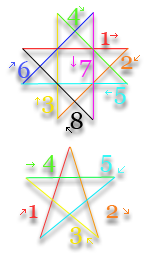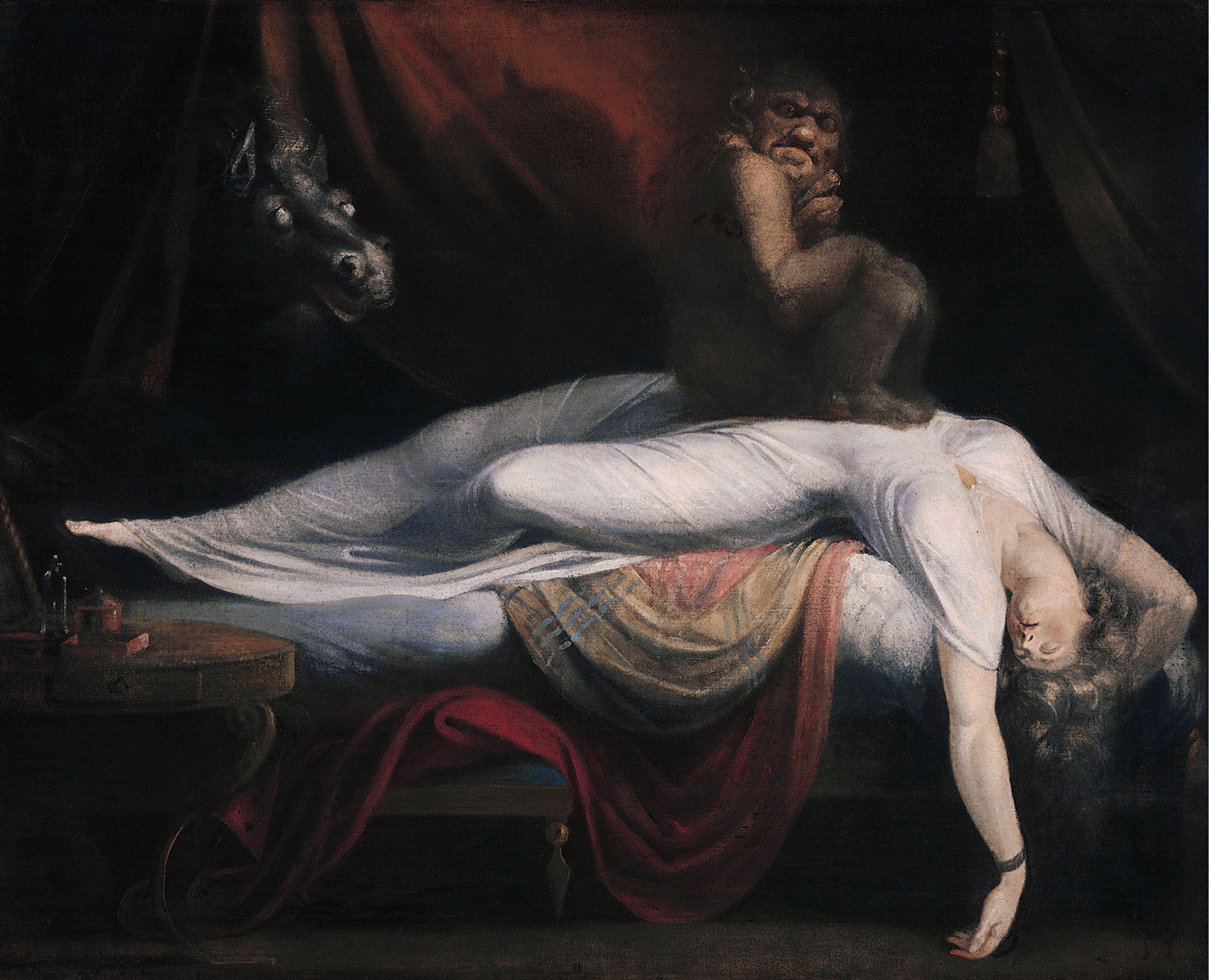|
Pesanta
In Catalan legend and popular culture, the Pesanta () is an enormous dog (or sometimes a cat) that goes into people's houses in the night and puts itself on their chests, making it difficult for them to breathe and causing them the most horrible nightmares. The Pesanta is black and hairy, with steel paws, but with holes, so it can't take anything. See also * Sleep paralysis * Against a Dwarf Three Anglo-Saxon metrical charms "Against a dwarf" ( ang, Ƿið dƿeorh) are contained within in the Lacnunga, which seek to heal an afflicted person by ridding them of a dwarf. Charms Remedies LXXXVIIc and LXXXVIIIc The remedies LXXXVIIc and L ... * Batibat * Lietuvēns * Mare (folklore) Catalan mythology Catalan legendary creatures Mythological dogs Catalan words and phrases Sleep in mythology and folklore {{Legendary-creature-stub ... [...More Info...] [...Related Items...] OR: [Wikipedia] [Google] [Baidu] |
Batibat
The Batibat is a vengeful demon found in Ilocano folklore. In Tagalog folklore, the creature is called Bangungot. The batibat takes the form of an ancient, grotesquely obese, tree-dwelling female spirit. They usually come in contact with humans when the trees in which they reside are felled and are made homeless, especially when their tree is made into a support post for a house. This causes them to migrate and inhabit what is left of their tree. The batibat forbids humans from sleeping near its post. When a person does sleep near it, the batibat transforms into its true form and attacks the person by suffocating their victim and invading their dream space, causing sleep paralysis and waking nightmares. This condition lends itself to the Ilocano word for nightmare, "batíbat" (or bangungot in Tagalog). To ward off the batibat, one should bite one's thumb or wiggle one's toes. In this way, the person will awaken from the nightmare induced by the batibat. In popular culture * The c ... [...More Info...] [...Related Items...] OR: [Wikipedia] [Google] [Baidu] |
Lietuvēns
Lietuvēns or lietonis (in Latgale also can be called “lītūņš”, similar to Slavic “mara” ( Russian: ''Мара'') or Lithuanian “lauma”) is a mythological creature in Latvian folklore. According to Latvian folk epics and omens, ''lietuvēns'' is the soul of a murdered (strangled, drowned or hanged) person cursed to live in this world as long as it has been meant to live. By some beliefs, it is the soul of an unbaptized child. It attacks both people and domestic animals. Sleep paralysis is thought to be torture or strangling by a lietuvēns. When under attack, one must move the toe of the left foot to get rid of the attacker. It is also said that lietuvēns is able to penetrate into houses, even through keyholes and, aside from nightmares, can strangle the victim. Appearance In Latvian folk culture, lietuvēns is usually described as a labored wretched child. It is small in height, moves fast, and comes at noon or night. Sometimes, but rarely, it turns into ugly ... [...More Info...] [...Related Items...] OR: [Wikipedia] [Google] [Baidu] |
Mare (folklore)
A mare ( ang, mære, odt, mare, ; in Old High German, Old Norse, and Swedish) is a malicious entity in Germanic and Slavic folklore that rides on people's chests while they sleep, bringing on nightmares.Bjorvand and Lindeman (2007), pp. 719–720. Etymology The word ''mare'' comes (through Middle English ) from the Old English feminine noun (which had numerous variant forms, including , , and ). These in turn come from Proto-Germanic . is the source of non, mara, from which are derived sv, mara; is, mara; fo, marra; da, mare; no, mare''/'', Dutch: (), and German: ()'. The ''-mar'' in French ('nightmare') is borrowed from the Germanic through Old French . Most scholars trace the word back to the reconstructed Proto-Indo-European root , associated with crushing, pressing and oppressing. or according to other sources 'to rub away' or 'to harm'. However, other etymologies have been suggested. For example, Éva Pócs saw the term as being cognate with the Greek (Ind ... [...More Info...] [...Related Items...] OR: [Wikipedia] [Google] [Baidu] |
Catalan Mythology
Catalan myths and legends are the traditional myths and legends of the Catalan-speaking world, especially Catalonia itself, passed down for generations as part of that region's popular culture. Mythological figures Among the figures of Catalan mythology are: * Aloja - In Catalan mythology an Aloja, also known as Dona d'aigua, Goja, or Paitida, is a feminine being that lives in places with fresh water. This "water-woman" can turn into water blackbirds. *Banyoles monster * Bubota * Catalan mythology about witches - Catalan tradition distinguished between bruixeria ("witchcraft") based on an explicit compact with the Devil, and fetilleria (deriving from a word related to "fetish", and Old Portuguese feitiço), magic worked through charms and fetishes. The former was considered inherently evil, while the latter might include the working of magical cures. In Catalan popular culture, there are a large number of legends about witches. In the popular imagination, a witch is a woman who, ... [...More Info...] [...Related Items...] OR: [Wikipedia] [Google] [Baidu] |
Catalan People
Catalans (Catalan, French and Occitan: ''catalans''; es, catalanes, Italian: ''catalani'', sc, cadelanos) are a Romance ethnic group native to Catalonia, who speak Catalan. The current official category of "Catalans" is that of the citizens of Catalonia, an autonomous community in Spain and the inhabitants of the Roussillon historical region in southern France, today the Pyrénées Orientales department, also called Northern Catalonia and ''Pays Catalan'' in French. Some authors also extend the word "Catalans" to include all people from areas in which Catalan is spoken, namely those from Andorra, Valencia, the Balearic islands, eastern Aragon, Roussillon, and the city of Alghero in Sardinia. The Catalan government regularly surveys its population regarding its "sentiment of belonging". As of July 2019, the results point out that 46.7% of the Catalans and other people living in Catalonia would like independence from Spain, 1.3% less than the year before. Historical ... [...More Info...] [...Related Items...] OR: [Wikipedia] [Google] [Baidu] |
Sleep Paralysis
Sleep paralysis is a state, during waking up or falling asleep, in which one is conscious but is completely paralyzed. During an episode, one may hallucinate (hear, feel, or see things that are not there), which often results in fear. Episodes generally last less than a couple of minutes. It can recur or occur as a single episode. The condition may occur in those who are otherwise healthy or those with narcolepsy, or it may run in families as a result of specific genetic changes. The condition can be triggered by sleep deprivation, psychological stress, or abnormal sleep cycles. The underlying mechanism is believed to involve a dysfunction in REM sleep. Lucid dreaming doesn't affect the chances of sleep paralysis but some lucid dreamers use this as a method of having a lucid dream. Diagnosis is based on a person's description. Other conditions that can present similarly include narcolepsy, atonic seizure, and hypokalemic periodic paralysis. Treatment options for sleep para ... [...More Info...] [...Related Items...] OR: [Wikipedia] [Google] [Baidu] |
Against A Dwarf
Three Anglo-Saxon metrical charms "Against a dwarf" ( ang, Ƿið dƿeorh) are contained within in the Lacnunga, which seek to heal an afflicted person by ridding them of a dwarf. Charms Remedies LXXXVIIc and LXXXVIIIc The remedies LXXXVIIc and LXXXVIIIc consist of writing Christian symbols, such as crosses and both Latin and Greek letters, along the arms of the sick person. This is then followed by mixing grated celandine with ale and invoking the names of saints, including the Welsh Saint Macutus. Remedy XCIIIb Remedy XCIIIb is the most detailed of the charms, consisting of writing the names of the Seven Sleepers of Ephesus on Communion wafers before reciting a : It has been noted that several components of this charm suggest that it was old at the time of its recording, such as the use of the word "", which would have had no clear meaning at the time of writing, and a lack of an alliterating vowel where expected in line 5 of the galdor. Interpretation and discussion It ... [...More Info...] [...Related Items...] OR: [Wikipedia] [Google] [Baidu] |
Catalan Legendary Creatures
Catalan may refer to: Catalonia From, or related to Catalonia: * Catalan language, a Romance language * Catalans, an ethnic group formed by the people from, or with origins in, Northern or southern Catalonia Places * 13178 Catalan, asteroid #13178, named "Catalan" * Catalán (crater), a lunar crater named for Miguel Ángel Catalán * Çatalan, İvrindi, a village in Balıkesir province, Turkey * Çatalan, Karaisalı, a village in Adana Province, Turkey * Catalan Bay, Gibraltar * Catalan Sea, more commonly known as the Balearic Sea * Catalan Mediterranean System, the Catalan Mountains Facilities and structures * Çatalan Bridge, Adana, Turkey * Çatalan Dam, Adana, Turkey * Catalan Batteries, Gibraltar People * Catalan, Lord of Monaco (1415–1457), Lord of Monaco from 1454 until 1457 * Alfredo Catalán (born 1968), Venezuelan politician * Alex Catalán (born 1968), Spanish filmmaker * Arnaut Catalan (1219–1253), troubador * Diego Catalán (1928–2008), Spanish philolo ... [...More Info...] [...Related Items...] OR: [Wikipedia] [Google] [Baidu] |
Mythological Dogs
Myth is a folklore genre consisting of narratives that play a fundamental role in a society, such as foundational tales or origin myths. Since "myth" is widely used to imply that a story is not objectively true, the identification of a narrative as a myth can be highly controversial. Many adherents of religions view their own religions' stories as truth and so object to their characterization as myth, the way they see the stories of other religions. As such, some scholars label all religious narratives "myths" for practical reasons, such as to avoid depreciating any one tradition because cultures interpret each other differently relative to one another. Other scholars avoid using the term "myth" altogether and instead use different terms like "sacred history", "holy story", or simply "history" to avoid placing pejorative overtones on any sacred narrative. Myths are often endorsed by secular and religious authorities and are closely linked to religion or spirituality. Many socie ... [...More Info...] [...Related Items...] OR: [Wikipedia] [Google] [Baidu] |
Catalan Words And Phrases
Catalan may refer to: Catalonia From, or related to Catalonia: * Catalan language, a Romance language * Catalans, an ethnic group formed by the people from, or with origins in, Northern or southern Catalonia Places * 13178 Catalan, asteroid #13178, named "Catalan" * Catalán (crater), a lunar crater named for Miguel Ángel Catalán * Çatalan, İvrindi, a village in Balıkesir province, Turkey * Çatalan, Karaisalı, a village in Adana Province, Turkey * Catalan Bay, Gibraltar * Catalan Sea, more commonly known as the Balearic Sea * Catalan Mediterranean System, the Catalan Mountains Facilities and structures * Çatalan Bridge, Adana, Turkey * Çatalan Dam, Adana, Turkey * Catalan Batteries, Gibraltar People * Catalan, Lord of Monaco (1415–1457), Lord of Monaco from 1454 until 1457 * Alfredo Catalán (born 1968), Venezuelan politician * Alex Catalán (born 1968), Spanish filmmaker * Arnaut Catalan (1219–1253), troubador * Diego Catalán (1928–2008), Spanish philol ... [...More Info...] [...Related Items...] OR: [Wikipedia] [Google] [Baidu] |




